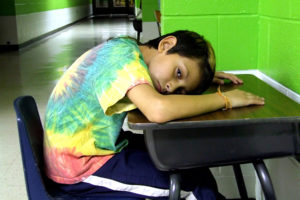A 2017 survey of Idaho high school students lists bullying, substance abuse, and suicidal thoughts—issues strongly affected by character—as the top problems plaguing the state’s youth.


A 2017 survey of Idaho high school students lists bullying, substance abuse, and suicidal thoughts—issues strongly affected by character—as the top problems plaguing the state’s youth.
“Those have always been top issues,” Post Falls School District Superintendent Jerry Keane told the Coeur d’Alene/Post Falls Press. “However, they seem to be even more difficult for students to deal with as the world gets more and more complicated. The bullying of young people over social media is definitely a new age problem that is a challenge for parents, law enforcement, and schools to eliminate.”
The Idaho Department of Education’s 2017 Youth Risk Behavior Survey questioned 1,818 students in 9th through 12th grade about a variety of issues in six categories; violent behavior, tobacco use, alcohol and drug use, sexual behaviors that lead to diseases and unintended pregnancy, unhealthy dietary behaviors, and inadequate physical activity. The survey was developed by the National Centers for Disease Control and Prevention.
One in four Idaho high schoolers said they’ve been bullied at school, and about 20 percent reported bullying online. Students who claim to have considered suicide in the last year increased to a 10-year high of 22 percent. Fourteen percent of students admitted to taking prescription drugs that didn’t belong to them, according to the news site.
Other problems seem to be on the decline, including underage smoking, and riding in a vehicle with someone under the influence. High percentages of students also feel confident they can find an adult at school to confide in, and 78 percent said they plan to continue their education after high school.
“Most kids have the ability to control items that hurt their body and mind like drinking, fighting, having sex, using tobacco, and accepting being hit,” Northwest Expedition Academy Principal Bill Rutherford told the Press. “These have all decreased due to public awareness and education in school. But, things that are being done to kids are increasing such as bullying, and electronic bullying which is creating this sense of helplessness in kids. Most kids are doing the right thing and making good choices but are still being bullied physically and cyberly, which creates a sense of helplessness, sadness, and causes students to become less healthy and overweight, and have suicide ideation.”
Northwest Expedition Academy, Post Falls Schools and nearby Cour d’Alene schools all incorporate strategies to help identify students in trouble, to encourage troubled students to seek help, and to discourage bullying.
Coer d’Alene schools spokesman Scott Maben pointed to the district’s suicide prevention program “Question, Persuade, Refer” (QPR).
“QPR saves lives by providing these ‘first responders’ with innovative, practical and proven suicide prevention training, and the knowledge that the signs of crisis are all around us,” Maben said. “We also have held training opportunities for parents and community members. We conduct suicide risk-assessment training every other year.”
“Reading this study, our job is to focus as hard on bullying as we have on tobacco, texting while driving, and alcohol use. This study shows that schools and parents have the power to overcome this sizable issue—if they work together,” Rutherford said.
Working together as a community by engaging parents and local leaders is also key to developing strong character education programs that help to prevent bullying and other risky behaviors by persuading students to think beyond themselves.
“For parents and other adults, the task of ‘saving our children’ means, in large part, telling children what they are being saved for. The task of educating children means teaching them the larger designs that could give form and focus to their individual aspirations, so they can come to understand not only how to be good but why,” James Davison Hunter, sociologist and founder of the Institute for Advanced Studies in Culture, writes in The Tragedy of Moral Education in America.
One lesson from the Jubilee Centre, for example, encourages students to pretend to look back on their lives 80 years from now, and to imagine how they want the influences of pleasure, wealth, status, power, knowledge, and ethics to shape their life.